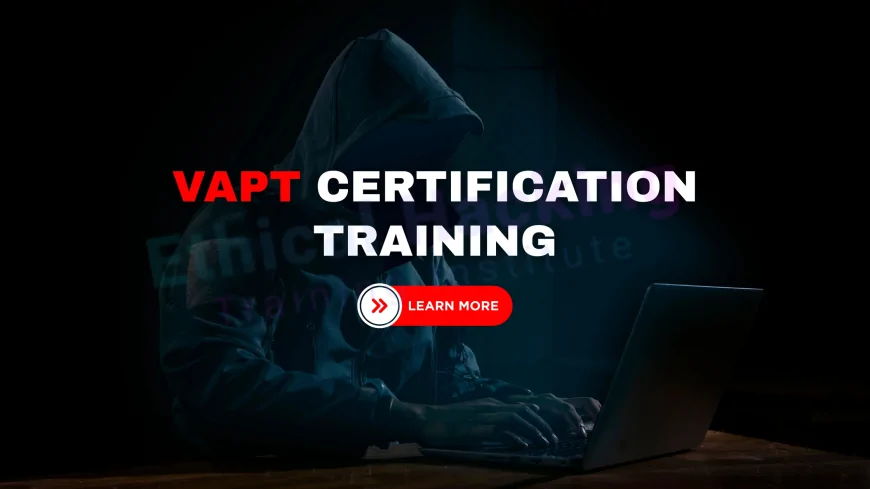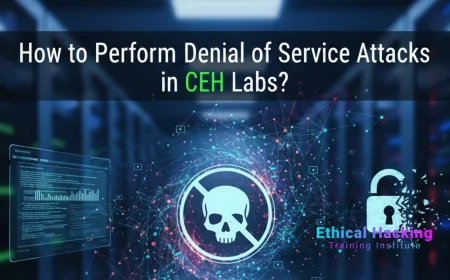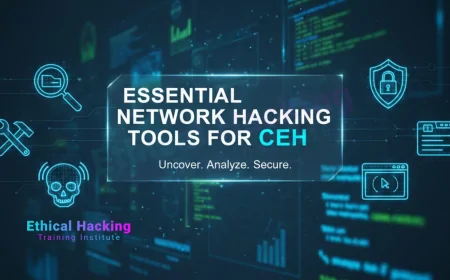Complete VAPT Training with Certification: Learn Vulnerability Assessment Today | VAPT Certification Bootcamp: Learn to Audit & Secure IT Infrastructure
Master VAPT with hands-on training and certification. Learn vulnerability assessment, penetration testing, and tools to launch your cybersecurity career.

Table of Contents
- Introduction
- What is VAPT?
- Why VAPT is Important in Today’s Digital Era
- Who Should Learn VAPT?
- Typical VAPT Course Content
- Top Tools Covered in VAPT Training
- Certification Options After Training
- Online vs Offline VAPT Training
- Real-World Projects in VAPT Courses
- Career Opportunities After VAPT Training
- Top VAPT Training Institutes
- FAQs
- Conclusion
Introduction
In today's digitally driven world, organizations face an increasing number of cyber threats that target their networks, web applications, and digital infrastructures. To combat these threats, cybersecurity professionals rely heavily on Vulnerability Assessment and Penetration Testing (VAPT)—a structured approach to identify, analyze, and mitigate security vulnerabilities before malicious attackers can exploit them.
Whether you're a budding ethical hacker, an IT administrator, or a cybersecurity enthusiast aiming to enhance your skills, enrolling in a Complete VAPT Training with Certification can open doors to high-paying and in-demand roles. This training not only equips you with the technical know-how to detect flaws but also teaches you how to ethically exploit vulnerabilities and prepare comprehensive security reports.
Pune, a major IT hub in India, is home to several reputed VAPT training institutes like WebAsha Technologies, which offer hands-on courses tailored to real-world cybersecurity challenges. These courses help you gain industry-recognized certifications and prepare you for roles such as penetration tester, vulnerability analyst, and security consultant.
In this article, we’ll explore the key components of VAPT training, its benefits, top institutes in Pune, certification paths, and everything you need to know to build a successful career in cybersecurity through certified VAPT training programs.
What is VAPT?
Vulnerability Assessment (VA):
This is a systematic review of security weaknesses in an information system. It uses automated tools to scan for:
-
Misconfigurations
-
Missing patches
-
Known vulnerabilities
-
Weak passwords
It provides a list of vulnerabilities, their severity, and recommended fixes, but does not exploit them.
Penetration Testing (PT):
This involves simulating real-world attacks to exploit vulnerabilities. It’s often manual and includes:
-
Ethical hacking techniques
-
Gaining unauthorized access
-
Exploiting software bugs
-
Testing defense mechanisms
It demonstrates what attackers can actually do if those vulnerabilities are left unpatched.
Purpose of VAPT:
-
To identify security risks before attackers do
-
To prioritize vulnerabilities based on potential damage
-
To comply with regulations (e.g., PCI-DSS, ISO 27001)
-
To establish a proactive security strategy for the organization.
Example Scenario:
A VAPT on an eCommerce website might reveal:
-
SQL injection flaws in the login form (VA)
-
And then simulate an attack to dump user data (PT)
Why VAPT is Important in Today’s Digital Era
With cyberattacks increasing across industries, VAPT has become a necessity for businesses. Here’s why:
- Identify Weaknesses: Detect flaws in networks, web apps, and servers before attackers do.
- Regulatory Compliance: VAPT is mandatory in many standards like ISO 27001, PCI-DSS, GDPR, etc.
- Protect Data: Secures sensitive customer and organizational data from breaches.
- Improve Security Posture: Helps organizations implement proactive cybersecurity measures.
Who Should Learn VAPT?
This training is beneficial for various individuals and professionals, such as:
- Cybersecurity Enthusiasts
- IT Administrators
- Ethical Hackers
- Network Engineers
- Software Developers
- Students pursuing careers in cybersecurity
Typical VAPT Course Content
A comprehensive VAPT training program usually includes the following modules:
- Introduction to Cybersecurity & VAPT
- Network Security Fundamentals
- Scanning & Enumeration Techniques
- Operating System Vulnerabilities
- Web Application Penetration Testing
- SQL Injection, XSS, CSRF, LFI, RFI Attacks
- Wireless Network Security Testing
- Exploitation using Metasploit
- Social Engineering Techniques
- Reporting and Documentation
Top Tools Covered in VAPT Training
VAPT training involves the hands-on usage of many industry-standard tools:
- Nmap
- Burp Suite
- Wireshark
- Nessus
- Metasploit
- OWASP ZAP
- SQLMap
- Kali Linux Toolset
Certification Options After Training
After completing a VAPT course, you may earn or prepare for the following certifications:
- Certified VAPT Professional (CVAPT)
- Certified Ethical Hacker (CEH)
- CompTIA Security+
- OSCP (Offensive Security Certified Professional)
- EC-Council Certified Security Analyst (ECSA)
Online vs Offline VAPT Training
Both learning formats offer unique benefits. Here’s a quick comparison:
| Criteria | Online Training | Offline Training |
|---|---|---|
| Flexibility | Self-paced or live virtual classes | Fixed class schedules |
| Practical Training | Includes both cloud-hosted virtual environments | on-site lab configurations for immersive learning. |
| Instructor Assistance | Get support via live chat, email, video consultations | or in-person guidance sessions. |
| Cost | Lower | Moderate to high |
Real-World Projects in VAPT Courses
Training institutes provide hands-on projects to simulate real-world attacks:
- Penetration Testing of a simulated banking web application
- Vulnerability scanning of corporate infrastructure
- Firewall evasion and IDS bypass techniques
- Capturing and decrypting network packets
- Writing VAPT reports and risk recommendations
Career Opportunities After VAPT Training
After certification, learners can explore job roles such as:
- VAPT Analyst
- Penetration Tester
- Cybersecurity Consultant
- Security Researcher
- Information Security Analyst
Top recruiters include Infosys, Wipro, TCS, Capgemini, Deloitte, EY, Accenture, and banking/defense sectors.
Top VAPT Training Institutes in Pune
1. WebAsha Technologies
WebAsha Technologies is one of the top-rated institutes in Pune for VAPT (Vulnerability Assessment and Penetration Testing) training. Known for its highly practical and certification-oriented approach, WebAsha offers expert-led training that prepares students for real-world cybersecurity challenges.
- Location: Pune (multiple branches including Shivaji Nagar and Hadapsar)
- Courses Offered: VAPT, CEH, OSCP, Network Security, Ethical Hacking
- Key Features: Hands-on labs, real-time projects, 100% placement assistance, global certifications
- Website: www.webasha.com
Frequently Asked Questions (FAQs)
1. What is VAPT?
VAPT stands for Vulnerability Assessment and Penetration Testing. It's a process to identify, evaluate, and test security weaknesses in systems, applications, or networks.
2. Is VAPT different from ethical hacking?
Yes. Ethical hacking is a broader term, while VAPT specifically focuses on identifying and exploiting vulnerabilities to strengthen security.
3. Who should take a VAPT course?
IT professionals, ethical hackers, cybersecurity enthusiasts, developers, and students aiming to enter the field of information security should take VAPT training.
4. What skills will I gain from VAPT training?
You’ll learn network scanning, vulnerability detection, exploitation, report writing, and the use of industry tools like Metasploit, Nmap, Burp Suite, and more.
5. Do I need a technical background to learn VAPT?
A basic understanding of networking, operating systems, and command-line usage is recommended, but many beginner-friendly courses are available.
6. What tools are commonly used in VAPT?
Popular tools include Nmap, Nessus, Burp Suite, Wireshark, Metasploit, SQLMap, and OWASP ZAP.
7. Is certification necessary after VAPT training?
Certification validates your skills and helps you stand out to employers. Many opt for Certified Ethical Hacker (CEH), CompTIA Security+, or CVAPT after training.
8. How long does a VAPT course typically take?
Course durations vary but usually range from 4 to 12 weeks, depending on depth and delivery mode (online/offline).
9. Are there real-world projects in VAPT courses?
Yes. Quality courses include hands-on projects like web app testing, network assessment, simulated attacks, and documentation exercises.
10. Can I learn VAPT online?
Absolutely. Many reputable institutes and platforms offer online VAPT training with virtual labs and instructor support.
11. What job roles can I get after completing VAPT training?
After certification, you can work as a penetration tester, vulnerability analyst, information security consultant, or SOC analyst.
12. What is the average salary after VAPT training in India?
Entry-level salaries range from ₹4 to ₹7 LPA, while experienced professionals can earn ₹12–25 LPA or more.
13. Does VAPT training include mobile application security?
Advanced VAPT courses may include mobile app and IoT device testing. Basic courses typically focus on networks and web apps.
14. Are VAPT skills relevant for freelancing?
Yes. Many VAPT professionals freelance in bug bounty programs, cybersecurity audits, and independent security testing projects.
15. Which certification is best after VAPT?
CEH, OSCP (Offensive Security Certified Professional), and ECSA are among the most respected certifications after VAPT training.
16. Can I do VAPT without a degree?
Yes. While a degree helps, practical skills and recognized certifications are often more important in the cybersecurity field.
17. What is the cost of a VAPT course in India?
Course fees typically range between ₹10,000 to ₹50,000 depending on the institute, format, and included certifications.
18. Are VAPT jobs in demand?
Yes. With rising cyber threats, VAPT professionals are in high demand across industries including finance, healthcare, IT, and defense.
19. How often should companies perform VAPT?
Ideally, VAPT should be conducted quarterly or after major system updates, new deployments, or reported cyber incidents.
20. Can I get placement assistance after VAPT training?
Many reputed institutes provide placement support, internships, or interview preparation as part of the training package.
Conclusion
VAPT training with certification is a powerful investment for individuals aiming to build a career in cybersecurity. With cybercrime on the rise, industries are actively seeking professionals who can assess vulnerabilities and secure digital infrastructures. Whether you're a student, IT professional, or cybersecurity enthusiast, VAPT skills can future-proof your career and position you as a sought-after expert in information security.
What's Your Reaction?
 Like
0
Like
0
 Dislike
0
Dislike
0
 Love
0
Love
0
 Funny
0
Funny
0
 Angry
0
Angry
0
 Sad
0
Sad
0
 Wow
0
Wow
0


















